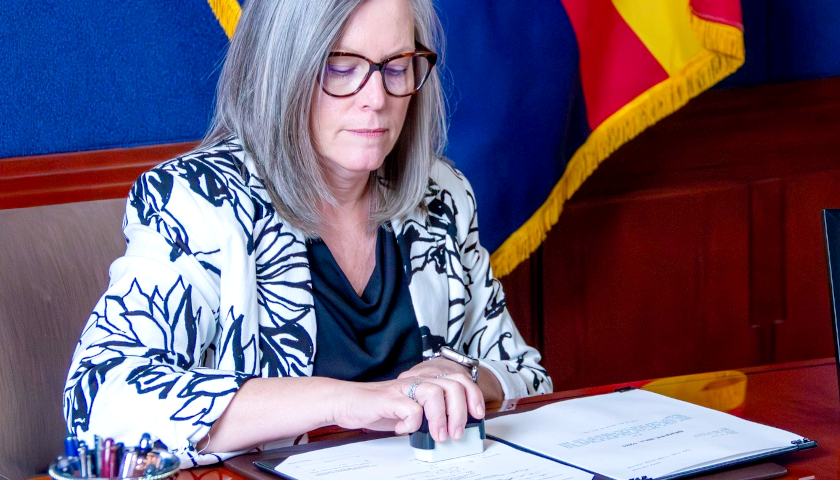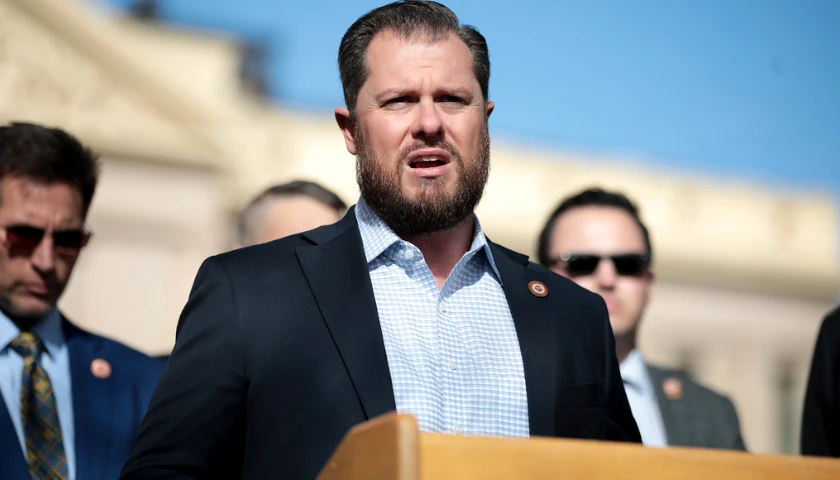by Natalia Mittelstadt
Democratic governors are vetoing election integrity legislation passed by Republican-led state legislatures, despite allegations, investigations, and convictions of election fraud occurring across the U.S. Those convictions require proof “beyond a reasonable doubt” that the crime, in fact, occurred.
Over the last few months, Democratic governors in Arizona, North Carolina, and Wisconsin have vetoed legislation that Republican-led state legislatures passed to help secure elections, arguing that their concerns are unfounded or their solutions unnecessary. However, there has been recent election fraud investigations and convictions in those states that led to the passing of the legislation.
Earlier this month, Arizona Gov. Katie Hobbs (D) vetoed bills that would respectively, prohibit people convicted of ballot abuse from holding elected office and prevent county recorders from sending voter registration cards to most residents who have out-of-state mailing addresses.
The former bill, House Bill 2612, was introduced after former San Luis City Councilwoman Gloria Lopez-Torres pleaded guilty to non-felony ballot abuse last June and then appointed as the new vice mayor of San Luis by the city council in December.
An investigation conducted by the state attorney general’s office and the Yuma County Sheriff’s Office determined that Torres had collected seven early-voting ballots for voters in the August 2020 primary election, giving them to another woman who put them in a ballot drop box, according to The Yuma Sun.
Torres pleaded guilty, received a sentence of 24 months’ probation, was ordered to pay a $2,500 fine, and not allowed to seek reelection to the city council.
Hobbs vetoed HB 2612, claiming it was “unnecessary.”
She also vetoed the second bill, HB 2404, saying that limiting the mailing of voter registration cards was “unnecessary” and both state law and the Elections Procedure Manual “already outline the process when a voter provides a new residential address that is located outside the state.”
However, state Rep. John Gillette (R), the bill’s sponsor, said in January that the legislation was to aid in preventing voter registration fraud and help clean county voter rolls, according to the Arizona Mirror.
In February, a report by the Public Interest Legal Foundation found that more than 400 non-citizens had been removed from the voter rolls of two Arizona counties since 2015, but that the actual number of non-citizens on the voter rolls is likely significantly higher.
Last month, Wisconsin Gov. Tony Evers (D) vetoed two bills that would have enacted more restrictions for casting and collecting absentee ballots from nursing homes residents.
The bills were passed by the GOP-controlled state legislature after the 2020 presidential election was conducted during the COVID-19 lockdowns, when voting skyrocket among nursing home residents.
Regarding the first bill, which changed procedures and requirements to allow nursing home workers to aid residents with voting, Evers said that he objected to it because the workers “have minimal training in election procedures.”
He added that the bill “would effectively require all ballots with even the most inconsequential mistakes to be discarded unless the clerk is able to return these ballots for timely correction, increasing the likelihood that an eligible Wisconsin voter may be disenfranchised and prevented from participating in our democracy.”
The second bill, which provided a process for incompetent individuals who are ineligible to vote to be changed to inactive voter status and required nursing home residents’ designated contact to be emailed about the resident voting, was vetoed for the latter provision.
“I cannot support legislation that could enable voter intimidation and interference while depriving eligible aging and older Wisconsinites casting their ballot of the dignity, privacy, and independence afforded to every other eligible Wisconsin voter,” Evers wrote in his veto.
According to a March 2022 special counsel report by retired state Supreme Court Justice Michael Gableman for the Wisconsin state Assembly, 91 nursing homes in the counties of Milwaukee, Racine, Dane, Kenosha, and Brown had voter turnout rates ranging from 95 percent to a 100 percent in 2020 — as compared to overall nationwide participation rates of 67 percent in 2020 and 60 percent in 2016.
Also in that month, the Amistad Project released a video of Wisconsin nursing home patients who had absentee ballots cast in their name for the 2020 presidential election.
The video shows Amistad Project attorney Erick Kaardal interviewing seven Wisconsin families of nursing home patients who had absentee ballots cast for them during the 2020 presidential election despite the fact that they are in poor health. The patients’ families attested that they are unable to vote.
In November 2021, the Racine County Sheriff’s Office requested that the state attorney general investigate alleged illegal directives issued by the Wisconsin Election Commission to bypass the state’s Special Voting Deputy process, under which the clerk of each municipality brings “enough ballots to each residential care facility to vote” and “assist the voters with the voting process.”
Instead, the commission had absentee ballots sent to nursing home residents by mail. The sheriff found that facility staff, under the guise of “helping” residents to vote, coaxed votes from some whom family members believed incapable of voting.
In October, the GOP-led North Carolina state legislature overrode the Democratic governor’s veto of two election bills, including Senate Bill 747, which prevented the use of private funds in election administration.
Late last year, two North Carolina counties — Brunswick and Forsyth — left the U.S. Alliance for Election Excellence, a project of the Center for Tech and Civic Life (CTCL), after joining it last year.
The alliance is awarding funds to counties and municipalities under the Centers for Election Excellence program. The alliance will provide $80 million over five years “to envision, support, and celebrate excellence in U.S. election administration,” according to CTCL.
However, both Brunswick and Forsyth counties chose to not take money from the alliance when they became members in 2023.
– – –
Natalia Mittelstadt is a reporter at Just the News.
Photo “Arizona Governor Katie Hobbs” by Governor Katie Hobbs.








